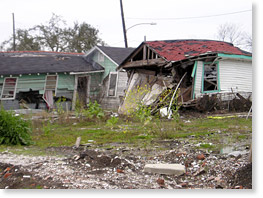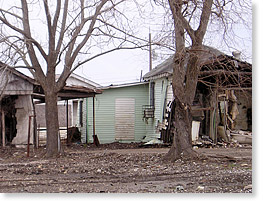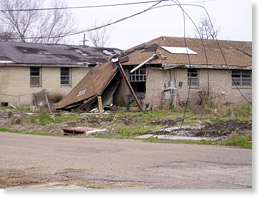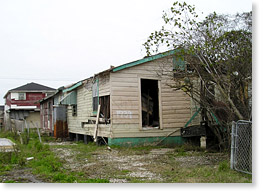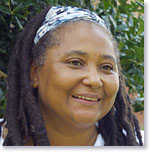Catastrophic events act merely as wake up calls, opportunities to seriously step up and do something that is going to make a difference. The smallest act of resistance and each gesture towards the alleviation of the suffering of others, whether on the Gulf Coast or elsewhere, is a step toward our own emancipation. Considering the condition of the world today, it is past time to answer the call and rise to the occasion. The United States Social Forum (USSF) represents an opportunity for individuals, organizations, and institutions committed to radical progressive change to rise in opposition to white supremacy and the ideology of manifest destiny. As organizers and cultural workers, we often use catastrophic moments in history to frame our work and to challenge the thinking of others. What we sometimes neglect to do is to fully educate ourselves about the issues, find out who else is working around the same issues, and to unpack our own world of privilege and prejudice. We sometimes neglect to enlarge our frame so that as we educate others and challenge their thinking we do the same for ourselves. Katrina, a Catalyst for Change? Katrina was more than a hurricane. Katrina was a political 'a-ha' moment that sent ripples throughout the social change movements, this government, and people observing around the globe. For the social justice movements, Katrina made it clear that we were not organized enough, nor strong enough to offer front line assistance to the grassroots communities most impacted by the natural and manmade disaster. For this nation, government neglect and ineptitude became transparent as we watched desperate people beg for rescue, for food, water … any type of assistance. Meanwhile, Republican opportunism, cronyism, and greed were blatant as evidenced by the naming of Halliburton as the single-bid contractor paid to clean up a devastated New Orleans. This was done even as they were under investigation for fraudulent billing and mismanagement of millions of tax dollars while performing some of the same tasks in Iraq. For people across the globe, Katrina revealed the soft underbelly of the beast. We saw television news coverage that stood in stark contrast to the standard programming that normally presents the United States as the land of the rich. Instead, people watched in horror as the institutionalized nature of USA racism and classism was revealed and shown to be alive and thriving in the waters of Katrina. There is a long dark history of racism and classism that lives at the heart of New Orleans politics and social structures. The history of our nation was stripped and paraded naked around the world while we all bore witness to callous public and private employees who left the elderly, sickly, and imprisoned to suffer a horrible fate in the rising toxic waters. It is one thing for the U.S. Social Forum to put the Gulf Coast disaster on their list of important political moments in our collective history, one of those catastrophic moments that open a political window. It is another for the people and grassroots organizations from the Gulf Coast to have a presence at the USSF in large enough numbers to present to - and for - the world the history of the region and the continuing aftermath of this disaster; and to help the rest of us make some clear connections. It is important that we understand we are all living our own personal, social, and political Katrina's. USSF: Where it All Began Early in the World Social Forum (WSF) process there was a call for a United States Social Forum. The call was resisted because there was not broad public awareness about the WSF process within the USA. This lack of awareness made it impossible to get broad representation from the diverse groups who have historically represented the front lines of resistance in the United States. According to Michael Leon Guerrero, who is emerging as the USSF historian, it all began in June 2003 at a meeting of the WSF International Council (IC) when Grassroots Global Justice Alliance (GGJ) decided to begin the discussion among USA organizations about a U. S. Social Forum. Two meetings were convened in 2004 to begin the discussions around policy, advocacy, and solidarity among the groups who agreed to support the USSF. This led to the creation of a national body to organize the forum. Some of the objectives set were intentional in their outreach to grassroots groups working in communities of color and representing working class people, and in figuring out how to make this gathering a part of movement building. In 2005, to acknowledge the impact that social and political struggle in the South have had on this nation, Atlanta was selected as the site for this historic gathering. Why Should People Come? The most compelling reason I know to attend this social forum is to raise your consciousness about the diverse social and economic movements in this country, so as to better see the world through a frame of social activism. We live in a world where corporations are afforded more privileges than people. We live in a world where the cry for corporate globalism hides the destruction that runaway capitalism visits on the poor and landless masses. Even working class people and most of the middle class are negatively impacted by this move to force poor and struggling countries to open their markets to corporate capital, often at the risk of forcing homegrown businesses to close, farmers to abandon their land, and pushing more and more people into poverty. Another reason to attend is to network, dialogue, share a meal, commune, and reason with people who would normally not be in your circle or on your radar. Organizations involved include NGO's like CARE and Amnesty International, labor unions like AFL-CIO and Jobs with Justice, and grassroots organizations like Chinese Progressive Association and the Coalition of Immokalee Workers. 20,000 organizers and activist from across this country and around the world in one place for you to learn from and share with - that has to be tempting. How Will One Benefit? The USSF represents a rare opportunity to gather with others from outside our normal circle of usual suspects. Instead of being among folks who tend to all think like us, we will be with people from every ethnic group in this country, working on every conceivable issue, some who view the world and the work/worth very differently from us. It is exciting to be among people who will possibly challenge us to make our work relevant to the local, regional, global world beyond our world. The questions that frame these benefits are the questions that are posed to us individually and as a community, questions that push us out of our comfort zone:
How Will One's Community Benefit? When we grow as organizers we bring a larger sense of community and connection to each other and global movements. We understand better how we can connect to serious issues as we work with others working for social change. Organizers and cultural workers can gain an integrated sense of self as part of an historical movement in this nation for social change. The USSF offers us an opportunity to deepen our interconnectedness as a community. Making Another World Possible? The final day of the USSF will include an assembly of social movements in the United States. Through this process we plan to collect a calendar of activism that will let us support each other's work at a national level. We will demonstrate how our issues all intersect. Hopefully, people will be inspired to strengthen our social and political connections, and campaigns.
For more information, visit www.USSF2007.org Published in In Motion Magazine April 8, 2007 Also read:
|
||||||||||||||||||||
|
If you have any thoughts on this or would like to contribute to an ongoing discussion in the  What is New? || Affirmative Action || Art Changes || Autonomy: Chiapas - California || Community Images || Education Rights || E-mail, Opinions and Discussion || En español || Essays from Ireland || Global Eyes || Healthcare || Human Rights/Civil Rights || Piri Thomas || Photo of the Week || QA: Interviews || Region || Rural America || Search || Donate || To be notified of new articles || Survey || In Motion Magazine's Store || In Motion Magazine Staff || In Unity Book of Photos || Links Around The World || OneWorld / US || NPC Productions Copyright © 1995-2012 NPC Productions as a compilation. All Rights Reserved. |
||||||||||||||||||||


